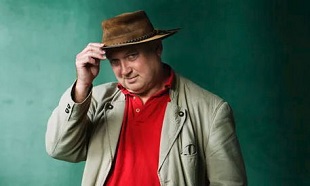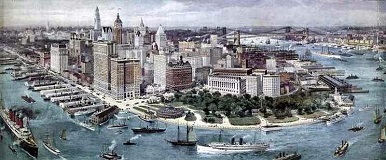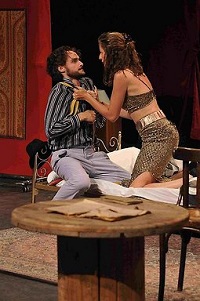De Nederlandse schrijver Jamal Ouariachi werd geboren in Amsterdam op 8 december 1978. Zie ook alle tags voor Jamal Ouariachi op dit blog.
Uit: Vertedering
“Uitgemergeld. Met een voorzichtige wijsvinger streelde hij over het hoofdje, zo klein dat je het met een pico-belloteken kon omvatten. Met twee vingers doodknijpen zou geen moeite kosten. Het schedelbot trilde onder de dunne huid. Het beestje opende de ogen. Ontstoken. Er zat althans een gistkleurig vlies over het blauw van de iris. Of hadden alle pasgeboren katjes dat? Hij was opgegroeid met een kat in huis, maar aan diens babytijd had hij amper herinneringen. Eén beeld: hoe het witharige mormeltje op de eerste dag bij zijn nieuwe gezin angstig wegkroop in de reuzenpantoffel van de heer des huizes.
Nicolaas hadden ze hem genoemd, omdat hij met zijn licht golvende witte vacht aan de baard van Sinterklaas deed denken.
Zijn vader, die tot dan toe niets van een huisdier had willen weten, raakte op slag vertederd door die kat in zijn pantoffel. Voortaan als hij thuiskwam van zijn werk en op de bank ging liggen om een halfuurtje te dutten, was Nicolaas de enige die hem mocht storen. De kat sprong dan boven op hem om zich, na een uitvoerige hartmassage met zijn voorpoten, uit te spreiden over de riante romp van zijn baasje. Als ze daar zo lagen met zijn tweeën, leek het werkelijk even of zijn vader Sinterklaas was en de kat zijn baard.
Er steeg gepiep op uit de mand, de andere hadden ontdekt dat er iets gaande was. Ook het rossige katje in zijn hand begon nu te piepen. Hoelang zouden ze hier al liggen zonder eten? Het was maandag, misschien had die mand hier wel het hele weekend gestaan.
Voorzichtig legde hij het katje terug tussen de andere. Het gepiep hield op. De vrachtwagen verderop reed weg. Het werd weer stil, op die onbestemde ruis na die de buitenwereld eigen is.
Op zijn horloge zag hij dat de pauze ten einde liep. Hij veegde zijn hand af aan zijn broek en vatte, geïrriteerd, de terugtocht aan. Dat uitgerekend hij die beesten moest vinden. Daar was hij mooi klaar mee. Eén uur per werkdag had hij pauze, één uur om zijn taken te vergeten en de rust in zijn hoofd terug te brengen tijdens een solitaire wandeling. Die kittens kon hij natuurlijk niets kwalijk nemen, maar degene die ze te vondeling had gelegd, ja, die moest eigenlijk dood.
Eenmaal weer aan het werk vergat hij zijn ergernis al snel. Steeds vrolijker ploegde hij zich door zijn verplichtingen heen.
Na werktijd sloop hij de keuken van de kantine in. Uit een grote afwasmachine haalde hij twee kommetjes waar de kantinedames tussen de middag de desserts in serveerden; uit de koeling stal hij een pak halfvolle melk. Op basis van een gezondheidsadvies van de ondernemingsraad had de directie verordend dat de kantine voortaan alleen nog halfvolle en magere melk mocht verkopen. Hij had geen idee of kittens daar ook baat bij hadden.
De spullen stopte hij in zijn tas, hij klokte uit – 17:08 uur, een latertje voor zijn doen – en hij verliet het pand. Het was een minuut of acht lopen naar het grasveld. Hij zou zijn gebruikelijke sneltram missen en in de piek van de avondspits belanden, maar dat deed er nu even niet toe.”

Jamal Ouariachi (Amsterdam, 8 december 1978)
De Britse dichter en schrijver Louis de Bernières werd geboren in Londen op 8 december 1954. Zie ook alle tags voor Louis de Bernières op dit blog.
Uit:The Dust That Falls from Dreams
“It had been so long since the death of a sovereign that no one knew what to say, or how to behave. Lord Salisbury refused to talk about the accession ceremonies because it was too upsetting. The well-to-do cancelled their dinner parties and balls, and the frivolous optimism that had accompanied the arrival of a new century evaporated. It was January, and the dark clouds that wept rain onto the land complemented the mood of the people beneath them.
The Queen’s relatives and descendants converged on Osborne from all over Europe. In South Africa the war that was supposed to have been won already was carried on by Botha, Smuts and de Wet. Money and young men continued to be expended. The British troops were killed mainly by enteric fever.
The tiny Queen died. The Lord Mayor of London was informed, and then the rest of the world. Whilst the nation lay stunned, the Great argued about what should be done next. Lord Acton announced that King Edward VII could not call himself Edward VII because he was not descended from previous Edwards. Did the Lord Mayor of London count as an ex-officio member of the Privy Council? He decided that he did, and gatecrashed it. Who was in charge of the funeral? Was it the Lord Chamberlain or the Duke of Norfolk, even though he was a Catholic? The Duke insisted on his historic right, and the King conceded. Lady Cadogan received an invitation to the interment that was intended for her husband, in which she was requested to come wearing trousers.
The Queen’s coffin was so minute that it might have been that of a child. King Edward and the Kaiser walked behind it as it was drawn through Cowes. It came across the Solent in a battle-ship, flanked by the greatest fleet in the world. In London the route from Victoria Station to Buckingham Palace then Paddington Station was blocked solid with mourners hoping to see the great procession of the gun carriage. Behind it rode King Edward, flanked by the Duke of Connaught and Kaiser Wilhelm, followed by the handsome and slim Crown Prince of Germany, the embodiment of hope for his nation, the guarantor of its great future as a beacon of civilisation.”

Louis de Bernières (Londen, 8 december 1954)
De Amerikaanse schrijfster Mary Catherine Gordon werd geboren op 8 december 1949 in Far Rockaway, New York. Zie ook alle tags voor Mary Gordon op dit blog.
Uit: Men and Angels
“But we won’t leave you stranded. I want you to know that, Laura,” Jack Chamberlain had said. “We found out from a friend of ours, a guy I work with, about a woman over in Chalk Farm who rents rooms to students. People your own age. You’ll have a ball, believe me. And then you’ll have your ticket home in August. It’ll be a great time for you, believe me. Shake the dust from your feet as you leave that house or town. She knew what they thought, that she was bad for the children. But the children liked her. Jennifer, the youngest child, cried when Laura said good-bye to her. Their parents didn’t understand them. But she understood. She always understood children. Their great unhappiness she always saw. They were victims of injustice from the moment of their birth. Believing human love to be important, they must suffer. This was how she could help them. She could teach them human love was not important, and their suffering would end, as hers had ended. How she had suffered every day before she knew. She had been a good child, and her mother had not loved her. She was slow, her mother said. And her mother was full of quickness; her movements danced, all the gestures of her hands, her words (her mother would make people laugh with her quickness) ended in points of silver. Laura was slow, slow in her movements like her father’s family. Yet the teachers said she showed great promise in some subjects. And Miss Gildersleeve, the home economics teacher, said Laura sewed like a dream. That’s good, said her mother, it’s a good hobby for an old maid.
Yet she had loved her mother, wanted to be near her, loved the feel of her bones through her light flesh, loved the quick movements of her skirt. She had loved her mother’s body as a child. If only her father had loved her. But her father loved her mother. Daughters frightened him. He would have liked a son.
But she no longer said, “If only they had loved me.” Now she knew that it was not important. She had suffered thinking that a parent’s love had meaning. Now she knew a parent’s love was nothing. She was the favorite, the chosen, and her parents had not known it. So she had suffered as all children must suffer till they know the truth. It was in a garden that the Spirit first had come to her. Four years ago, when she was seventeen. She had been so unhappy then. Had always been, before she knew the truth. It was in a garden that the Spirit first had come to her. Four years ago, when she was seventeen. She had been so unhappy then. Had always been, before she knew the truth.”

Mary Gordon (Far Rockaway, 8 december 1949)
Cover
De Amerikaanse schrijver Bill Bryson werd geboren in Des Moines (Iowa) op 8 december 1951. Zie ook alle tags voor Bill Bryson op dit blog.
Uit: Een huis vol (Vertaald door Inge Kok, Peter Diderichen Peter Diderich)
“Gezamenlijk worden ze vitaminen en mineralen genoemd en er is heel veel – echt verrassend veel – wat we er niet van weten, onder andere hoeveel we er nodig hebben, wat sommige precies doen en in welke hoeveelheden ze het best kunnen worden ingenomen.
Dat we ze überhaupt nodig hebben was informatie waar we verbazend lang op hebben moeten wachten. Tot ver in de negentiende eeuw is niemand ooit op het idee van een uitgebalanceerde voeding gekomen. Men geloofde dat al het voedsel één enkele vage, maar versterkende stof bevatte: ‘het universele voedingsmiddel’. Een kilo biefstuk had dezelfde waarde voor het lichaam als een kilogram appels of pastinaken of wat dan ook, en een mens hoefde er alleen maar voor te zorgen dat hij er meer dan genoeg van binnenkreeg. Niemand had ooit gedacht dat bepaalde soorten voedsel onmisbare elementen bevatten die van cruciaal belang waren voor je welzijn. Dat hoeft ons niet echt te verbazen, want de verschijnselen van tekorten in je voeding – apathie, pijnlijke gewrichten, een verhoogde gevoeligheid voor infecties, wazig zien – wijzen zelden op een onevenwichtige voeding. Als je haar begint uit te vallen of je enkels onrustbarend dik worden, is het zelfs vandaag de dag niet waarschijnlijk dat je als eerste denkt aan wat je de laatste tijd hebt gegeten. En je zou al helemaal niet denken aan wat je níét had gegeten. Dat gold ook voor de verbijsterde Europeanen die heel lang dikwijls in ontstellende aantallen doodgingen zonder te weten waarom.
Er is beweerd dat er tussen 1500 en 1850 alleen al aan scheurbuik twee miljoen zeelieden zijn overleden. Op een lange reis bezweek doorgaans ongeveer de helft van de bemanning eraan. Er zijn uiteenlopende wanhoopsmiddelen uitgeprobeerd. Vasco da Gama moedigde zijn mannen aan om tijdens een reis naar India en terug hun mond te spoelen met urine, wat niet hielp tegen scheurbuik en waar ze ook niet veel vrolijker van zullen zijn geworden. Soms was het aantal slachtoffers werkelijk schokkend. Rond 1740 verloor een Britse marine-expeditie onder bevel van commandeur George Anson tijdens een reis van drie jaar veertienhonderd van de tweeduizend opvarenden. Vier werden gedood tijdens gevechten; vrijwel alle anderen zijn overleden aan scheurbuik.”

Bill Bryson (Des Moines, 8 december 1951)
Cover
De Ierse schrijver en criticus John Banville werd geboren op 8 december 1945 in Wexford. Zie ook alle tags voor John Banville op dit blog.
Uit:Mrs. Osmond
“It had been a day of agitations and alarms, of smoke and steam and grit. Even yet she felt, did Mrs. Osmond, the awful surge and rhythm of the train’s wheels, beating on and on within her. It was as if she were still seated at the carriage window, as she had sat for what seemed impossibly many hours, gazing with unseeing eyes upon the placid English countryside flowing away from her endlessly in all the soft- green splendour of the early- summer afternoon. Her thoughts had sped along with the speeding train but, unlike the train, to no end. Indeed, she had never registered so acutely the mind’s unstoppable senseless headlong rush as she had since leaving Gardencourt. The great snorting and smoking brute that had paused with brusque impatience at the meek little village station and suffered her to take her place in one of its lattermost compartments— her fingertips still retained the impression of hot plush and greasy leather— now stood gasping after its mighty efforts under the high, soot- blackened glass canopy of the throbbing terminus, disgorging on to the platform its complement of dazed, bedraggled travellers and their jumbles of baggage. Well, she told herself, she had arrived somewhere, at least.
Staines, her maid, had hardly stepped down from the train before she flew into an altercation with a red- faced railway porter. Had she not been a female it might have been said of Staines that she was a fellow with a heart of oak. She was tall and gaunt, a person all of angles, with long wrists and large feet, and a jaw that put one in mind of the blade of a primitive axe. In the years that she had been in Mrs. Osmond’s employ, or, given how closely they were conjoined, better say in the years that they had been together, Staines’s devotion to her mistress had not wavered by a jot. In their long period of exile in the south her forbearance had extended to putting up with the Italian market and the Italian kitchen, and, which required an even more saintly fortitude, with Italian plumbing. Indeed, such was her steadfastness that on occasion Mrs. Osmond— Isabel—found herself longing wistfully for even half a day’s respite from her servant’s unrelenting, stone-hard solicitude. In their recent travels together the chief token and proof of Staines’s loyalty had been a permanently maintained state of vexedness, not only in face of the impudence of porters, cab- drivers, boot-boys and the like, but also against what she considered her mistress’s wilful credulousness, deplorable gullibility and incurably soft heart. Now, as the maid, her bonnet fairly wagging from the force of her indignation, stood berating the porter for unspecified shortcomings—as a Londoner she was exercising her right to quarrel with her own kind, in her own city—Isabel moved away with that wide-eyed blandness of manner she had perfected over the years at the scenes of so many similar confrontations between Staines’s will and the world’s recalcitrance.”
John Banville (Wexford, 8 december 1945)
De Amerikaanse dichter en schrijver Delmore Schwartz werd geboren op 8 december 1913 in New York. Zie ook alle tags voor Delmore Schwarz op dit blog.
Dogs Are Shakespearean, Children Are Strangers
Dogs are Shakespearean, children are strangers.
Let Freud and Wordsworth discuss the child,
Angels and Platonists shall judge the dog,
The running dog, who paused, distending nostrils,
Then barked and wailed; the boy who pinched his sister,
The little girl who sang the song from Twelfth Night,
As if she understood the wind and rain,
The dog who moaned, hearing the violins in concert.
—O I am sad when I see dogs or children!
For they are strangers, they are Shakespearean.
Tell us, Freud, can it be that lovely children
Have merely ugly dreams of natural functions?
And you, too, Wordsworth, are children truly
Clouded with glory, learned in dark Nature?
The dog in humble inquiry along the ground,
The child who credits dreams and fears the dark,
Know more and less than you: they know full well
Nor dream nor childhood answer questions well:
You too are strangers, children are Shakespearean.
Regard the child, regard the animal,
Welcome strangers, but study daily things,
Knowing that heaven and hell surround us,
But this, this which we say before we’re sorry,
This which we live behind our unseen faces,
Is neither dream, nor childhood, neither
Myth, nor landscape, final, nor finished,
For we are incomplete and know no future,
And we are howling or dancing out our souls
In beating syllables before the curtain:
We are Shakespearean, we are strangers.

Delmore Schwartz (8 december 1913 – 11 juli 1966)
Prent van New York uit 1913, vogelperspectief, met de hand ingekleurd
De Amerikaanse zanger, dichter en tekstschrijver James Douglas (Jim) Morrison werd geboren in Melbourne (Florida) op 8 december 1943. Zie ook alle tags voor Jim Morrison op dit blog.
The World on Fire
The world on fire …
Taxi from Africa…
The Grand Hotel…
He was drunk
a big party last night
back going back
in all directions
sleeping these insane hours.
I’ll never wake up
in a good mood again.
I’m sick of these stinky boots.
Freedom Exists
Did you know freedom exists
In school books
Did you know madmen are
Running our prisons
Within a jail, within a gaol
Within a white free protestant
Maelstrom
We’re perched headlong
On the edge of boredom
We’re reaching for death
On the end of a candle
We’re trying for something
That’s already found us

Jim Morrison (8 december 1943 – 3 juli 1971)
De Franse theaterauteur Georges Feydeau werd geboren op 8 december 1862 in Parijs. Zie ook alle tags voor George Feydeau op dit blog.
Uit: Le dindon
« LUCIENNE. — Ah ! c’est-à-dire que tu ne saurais trop remercier monsieur.
VATELIN, pendant que Pontagnac se confond en salutations qui dissimulent mal son trouble. — N’est-ce pas ? Je vous dis que c’est tout à fait gentil d’être venu, et surtout de cette façon-là !
LUCIENNE — Ah ! oui, surtout de cette façon-là !
Elle va à la cheminée.
PONTAGNAC. — Ah ! vraiment, cher ami, madame ! (À part.) Ca y est ! elle se fiche de moi !
VATELIN,. — Mais, j’y pense, vous ne connaissiez pas ma femme… (Présentant.) Ma chère Lucienne, un de mes bons amis, M. de Pontagnac… Ma femme.
PONTAGNAC.. — Madame !
VATELIN,. — Au fait ! je ne sais pas si c’est très prudent ce que je fais là de te présenter Pontagnac.
PONTAGNAC. — Pourquoi ça ?
VATELIN,. — Ah ! c’est que c’est un tel gaillard. Un tel pécheur devant l’Eternel ! Tu ne le connais pas ? Il ne peut pas voir une femme sans lui faire la cour ! il les lui faut toutes !
LUCIENNE railleuse. — Toutes ! Ah ! ça n’est pas flatteur pour chacune.
PONTAGNAC.. — Oh ! madame, il exagère ! (À part.) Est-il bête de lui raconter ça !
LUCIENNE devant la cheminée. — Quelle déception pour la pauvre femme qui a pu se croire distinguée et qui finit par s’apercevoir qu’elle n’est qu’additionnée.
PONTAGNAC. — Je vous répète, madame, que c’est une calomnie.
LUCIENNE. — Ah ! j’avoue que si j’avais dû être une de ces “toutes”, je n’en serais pas fière… Asseyez-vous donc !…
Elle s’assied dans le fauteuil, près de la cheminée.
PONTAGNAC, à part, en s’asseyant sur le canapé. — C’est bien ça ! elle me raille.
Vatelin, s’asseyant près d’eux. — Dites donc ! Je crois qu’elle vous bêche! »

Georges Feydeau (8 december 1862 – 5 juni 1921)
Scene uit een opvoering in Herblay, 2013
Zie voor nog meer schrijvers van de 8e december ook mijn vorige blog van vandaag.

